
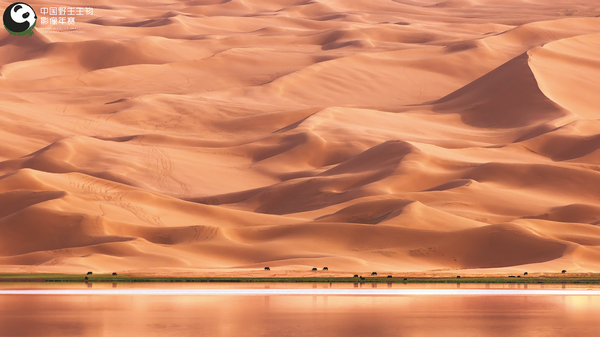
On vibrant green moss, a Heteropoda davidbowie, of the huntsman spider species, carries a white egg sac, its orange body blazing like a fiery flame, strikingly vivid and captivating against the faintly visible ferns in the surroundings.
It has a way of pulling the audience into the dreamlike microscopic world, which is rarely seen by the naked eye but was captured in a photo by the Malaysian photographer Lam Soon Tak.
His clever manipulation of the light creates a darkened backdrop that throws into sharp relief the precious moment of the spider's reproductive behavior.
Before the viewers had time to reconcile the fantastical elements, a short video abruptly pulled them back to the harsh reality of nature as it vividly showed how bar-headed geese, nesting on the cliffs of the Qilian Mountains across China's northwestern Qinghai and Gansu provinces, guide their newborn goslings to leap from the heights.
The hardship is only the beginning of the trials and tribulations the geese family has to endure, while foraging along the banks of Qinghai's Buha River as they fend off predatory Pallas's gulls.
The dynamic visuals of the dramatic twists and turns of the birds' fate, filmed by a Chinese crew, hammered home the concept of nature's survival of the fittest and the journey of a life that never ceases.
The two works are among a total of 17 images and videos that dazzled the audience at the awards ceremony of the China Wildlife Image and Video Competition in Beijing on Dec 1.
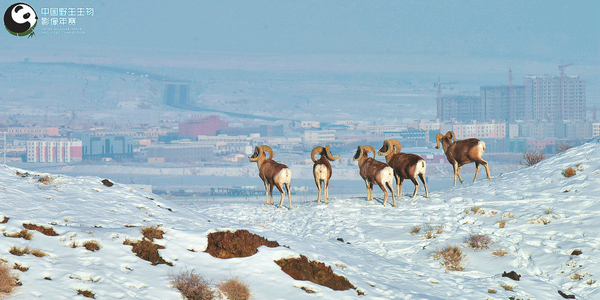
They stood out from more than 37,600 submissions from across the world, and covered a wide range of wildlife groups, natural conservation areas, and the relationship between humans and nature, presenting a rich and multidimensional view of wildlife and ecological diversity.
The competition was hosted by the Chinese National Geography and sought to deepen public understanding and appreciation of wildlife and natural ecosystems, while promoting conservation efforts.
This year marks the 5th session of the competition that was initiated in 2020, with a record high in both total submissions and international entries, says Li Shuanke, editor-in-chief of Chinese National Geography.
"This year's theme — Spirituality of Mountains and Seas — symbolizes humanity's timeless yearning for and imagination of nature. Among the numerous submissions, we deeply felt each individual's curiosity and affection toward their natural home, as well as their attention to and care for wildlife," Li says, adding that this theme also captures the harmonious resonance between the myriad beings of nature and the creators of natural imagery.
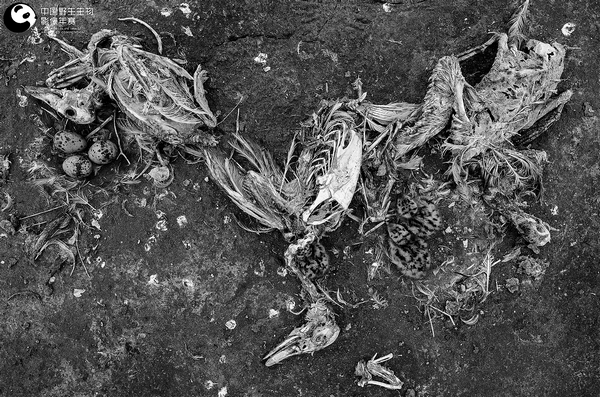
Jia Haining, whose team won the best production award in the short film category for their work zooming in on wildlife, highlighting a bunch of Oriental storks gracefully traversing the Yellow River Delta, says the award is a great encouragement.
The video is aimed at showcasing the ecological features of the Yellow River Delta, a harmonious coexistence between humans and nature.
"Through the lens of the Oriental storks' story, we reveal the biodiversity of the Yellow River Delta across four seasons, and China's successful ecological practices and insights, demonstrating Chinese wisdom in ecological governance," Jia says.
"This is the foundation and purpose of our work — to tell the world about the country's journey and contributions to achieving harmony between humans and nature."
Jia considers the essence of their work lies in capturing the fleeting details that genuinely touch people's souls on the filming site.
"I believe this holds true not only for nature but for other types of storytelling as well," he says.
Reflecting on the filming process, the crew waited nearly two months to capture the moment when young Oriental storks took their first flight, he says. Similarly, to film wild red-crowned cranes foraging, they had to arrive at the location by 4:30 in the morning and remain in position. "Our work approach was not dictated by past filming experience but by the habits and pace of the birds' lives," Jia says.
"This allows for zero tolerance for mistakes," he notes, adding that the project's execution cycle spanned one year, with filming constrained to migration and breeding seasons.
Essentially, within a one-year time frame, Jia's team only got one shot.
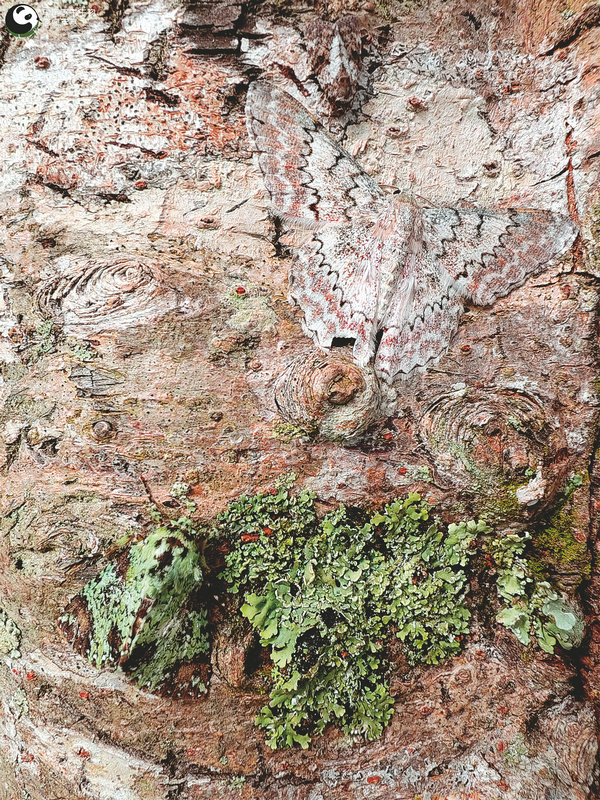
"Our filming team not only had to master the equipment but also understand how to coexist with birds. Success then came along after continuous self-improvement, patience to embrace solitude, and establishment of a rapport with time and nature itself," Jia says.
The judge panel states that the work paints a vivid tableau of the myriad creatures co-creating the ecosystem of the delta.
"With a meticulous edit of rare and valuable footage, a distinct chapter-based narrative style, and a seamless harmony between symphonic music and the diverse behaviors of the delta's species, the work comes together as a naturally orchestrated symphony of life," according to the panel's review.
Over the past five years, the competition has received more than 157,100 submissions from 81 countries and regions worldwide, amassing more than 60,000 minutes of footage, including 630 award-winning pieces. The related content has garnered over 500 million views online, according to the organizer of the competition.
As this competition is hosted by Chinese National Geography, a science-focused media organization, it aims not only to present compelling stories of life through these extraordinary visual works, but also to deliver pieces truly worthy of deep reflection, says Chen Yihuan, general manager at Chinese National Geography.
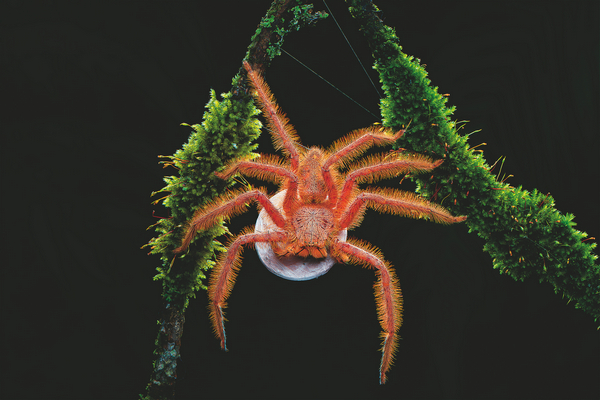
"Our perspective goes beyond that of just the creators. We focus more on the broader audience — ordinary people — whether as consumers viewing these works or as individuals inspired by them to create and share their own," Chen says.
"From this angle, we believe that those who appreciate wildlife photography are likely also fans of nature documentaries," Chen adds. "We are committed to providing a platform for creators in this field who share the same values, fostering a community that resonates with their passion for the natural world."
Special awards, such as those for mobile phone photography and popular video-sharing Douyin platform presentation, were introduced in this year's competition to encourage public engagement in nature photography and biodiversity conservation.
The public drive has sparked significant interest, with related Douyin topics accumulating over 120 million views, according to the organizer.
To better engage the public, more than 100 natural photography works have been put on display in an exhibition at the China World Mall in Beijing. They were selected from more than 100,000 entries submitted to the competition over the past five years. The exhibition, opened to the public free of charge on Tuesday, will run until Jan 20.
"I've just been around the exhibition of these photographs, taken by traditional photographers, photographs taken on phones, and I have been seeing some of the most amazing and incredible pictures," says the internationally renowned British primatologist Jane Goodall, who has thrown her weight behind the development of the competition over the years.
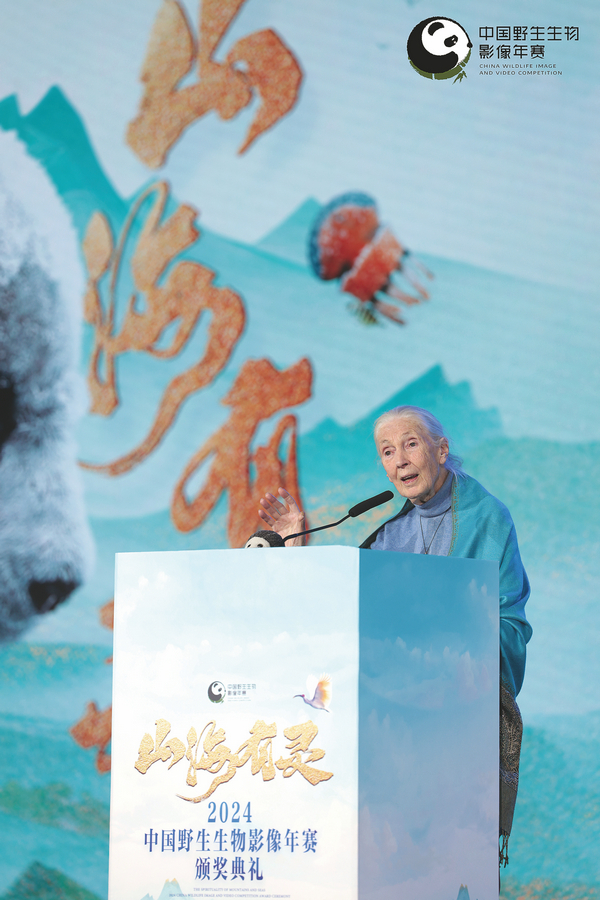
The 90-year-old says she is drawn to those works highlighting the natural world, the dramatic and comical moments in the lives of animals.
"I was transported into other worlds, and I think that's the value of this competition," Goodall says.
She takes delight that those photographs were done by not necessarily professional photographers but people who love nature.
"Having a competition like this is a way of encouraging young people to go out into nature and look around at the wonders of nature," she says.
"There are many people living in the cities who do not get the opportunity to go out into the really wild places, and the photography, videography and filmmaking can at least give them some idea," she adds. "At least people can feel immersed in nature; they can feel something of the awe and wonder that we get if we are lucky enough to go out into nature, to see a large waterfall, to hear the water crashing down onto the gravel below."
Contact the writer at yangfeiyue@chinadaily.com.cn